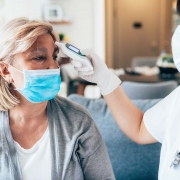The Dawn of a New Year: A Message from Our President & COO
As we usher in the New Year, I wanted to take this opportunity to look back on what was one of the most challenging years on record. COVID-19 claimed hundreds of thousands of lives in 2020 and took an emotional, physical, and financial toll on countless others worldwide—and we are not out of the woods yet even with vaccinations underway.
The pandemic has also had a catastrophic effect on cancer care and research. Over the past year, fewer patients scheduled office visits, screenings, biopsies and even surgeries because they feared COVID-19 exposure. It’s an alarming and potentially deadly trend. By causing a decrease and delay in identifying new cancers or discovering new forms of treatment, these pandemic-generated care gaps could accelerate cancer mortality rates for many years.
At American Oncology Network (AON), dealing with the fallout from COVID-19 while providing our patients with top-quality care is one of the many challenges we continue working to overcome in 2021.
Working Through the Pandemic
According to a recent study in JCO Clinical Cancer Informatics, when the pandemic hit its peak in April, screenings for breast cancer (85%), colon cancer (75%), prostate cancer (74%) and lung cancer (56%) sharply decreased from where they were in 2019. And even though stay-at-home orders were lifted (in some cases temporarily) throughout most of the country, the study also reported that fewer patients are having surgery, receiving treatment and scheduling critical follow-up appointments for existing cancers.
This dip in office visits not only has an adverse effect on patients who were undergoing treatment prior to the pandemic, but it also leads to fewer cancer diagnoses—cancers that will eventually be diagnosed at a later stage and require more complex care. Late-stage diagnoses often lessen the chances for a cure, which drives up mortality rates.
While the presence of COVID-19 continues, AON is working with the practices in our network to remind patients to stay on top of their appointments and screenings. Our practices offer telehealth, allowing patients to meet with their providers from the comfort of home.
We also have in place exceptional safety protocols. Days after the World Health Organization declared COVID-19 a pandemic in March, we assembled an emergency task force to identify and monitor protective measures and supplied our clinics and staff with copious amounts of personal protection equipment (PPE) and appropriate cleaning products, thereby ensuring patients who had to come to our clinics could do so safely. And we continue to perform daily temperature screenings on patients and employees across all our locations.
Vaccines will bring us some relief in 2021. But AON will continue to do all we can to prevent and mitigate the spread of COVID-19 to keep our patients safe while getting the care they need and deserve.
Fighting for Our Patients and Practices
We are doing everything in our power to ensure our patients have access to the great care and medications provided by our practices. To that end, we are working with our public policy partners and the Community Oncology Alliance (COA) to put a stop to the Most Favored Nation (MFN) Model announced by the Centers for Medicare & Medicaid Services (CMS).
In accordance with the MFN, Medicare will reimburse only the 38 most used drugs in oncology at a rate below the average sale price. According to COA, these include mainstay breast, lung and prostate cancer drugs, as well as the latest cutting-edge immunotherapies that have had significant results in improving survival rates. The rate will continue to decrease over a five-year period until it hits MFN price — which, according to COA, will be so low that clinics will have to send patients to 340B hospitals for treatment.
One recent study shows that, under the MFN model, out-of-pocket drug costs will be lowered for less than 1% of Medicare beneficiaries. According to COA, CMS estimates that in the first year of the MFN, 20% of seniors will be required to find new oncologists and treatment and nearly half of those will forgo treatment. By 2023, 30% of Medicare seniors may be displaced with 1 in 5 not getting treated.
It appears, however, the MFN may not come to pass. The U.S. District Court in Washington, D.C. is in the process of hearing COA’s complaint, as well as a temporary restraining order and preliminary injunction that have been filed to delay the measure’s implementation.
Medicare Reimbursement Sequestration
Because of the extensive financial burden placed on patients and clinics by the COVID-19 pandemic, we are also fighting against the extension of the Sequestration on Medicare Reimbursement, which is part of The Coronavirus Aid, Relief and Economic Security (CARES) Act. Extending these 2% cuts, which were enacted by Congress in 2013, will drive up costs for both patients and clinics across the country and no doubt lead to more harmful lapses in care.
The moratorium began on May 1, 2020 and was set to expire on December 31, 2020. Because of the ongoing pandemic, however, it has been extended through March 31, and the 2% Medicare cuts will not be applied in the first quarter of this year.
Despite these challenges, AON’s top priority for 2021 and beyond will always be our patients. We and our participating practices vow to continue to do what we do best — provide top-quality cancer care to patients right in their own backyard.














